Facebook Destroys Everything: Part 3
Meta has failed at world domination so far, but Elon Musk has given them a hell of an assist.

When Covid arrived, I was, like most reasonable people, terrified of the virus. I was also absolutely terrified by the glittering, data-hoovering opportunity that a global pandemic represented for the always-hungry likes of Facebook and Google.
My fears about how Big Tech might take advantage of this planet-sized tragedy only solidified after it came out in early March 2020 that the Trump administration had been holding conference calls with Silicon Valley to discuss how they might be able to work together on battling the pandemic - and if the companies had any useful data they might be willing to share with the federal government.

My mind filled with visions of an unholy alliance between privacy-destroying tech firms and the deranged Trump administration, who could use public health concerns to legally mandate that Americans cough up their health and location data to both Zuck and the MAGA set in exchange for access to Covid testing and vaccines.
There was some precedent for my paranoia.
I’d spent the last decade watching as Facebook sweet-talked governments, medical systems, and non-profits around the world into adopting their platform for communicating with the public about crises, seducing decision-makers with promises of an easy, domesticated solution that would liberate them from having to futz with building and updating their own websites.
I’d also watched in disgust as how, after crucial organizations became comfortable with pushing out vital information on Facebook, the company began to make it harder and harder for people to find or to view those potentially life-saving posts if they weren’t already logged in. The end-game was obvious: they were building a world where if someone wanted to look at updates from their city government on local flooding, or see what their local hospital was saying about flu vaccinations, they’d have to submit to becoming legible to Facebook first.
Covid, then, represented a massive opportunity for a company that was already so clearly hell-bent on taking advantage of disaster and crises as away to herd even more organizations and people into its blue, walled-off paddocks.
And while it was true that Facebook and Trump regularly sparred with one another in public, as GOP leaders complained that the platform was unfairly censoring them (when in truth, the site was doing the exact opposite), it was a different story in private.

At the time, Facebook policy vice president and former George W Bush policy advisor Joel Kaplan - a notorious participant in the 2000 “Brook’s Brothers” riot that helped secure the presidency for George W Bush - was working overtime to win the MAGA set’s trust. Why wouldn’t Zuckerberg and his highly-paid and ethically suspect colleagues take the opportunity to partner, at least for now, with the Trump administration?
Much to my surprise, and relief, both Trump and Facebook spectacularly fumbled the world-domination bag.
In retrospect, it was even less surprising that the rift between the MAGAs and Big Tech began over disinformation.
In early March, as the world became horribly aware that Covid was both real and destined to become real bad, Facebook joined forces with Google and Twitter to announce that their sites would make a special effort to counter the spread of egregious misinformation about the pandemic.
Then came May 25th, 2020, and the brutal murder of George Floyd at the hands of a bloodthirsty Minneapolis cop. As protests against police brutality ignited across the United States, social media users were confronted with a tsunami of hate speech and disinformation directed against Black Americans and activists. Perhaps anticipating what would happen next, Trump hastened to sign a executive order on “preventing online censorship,” although it was almost entirely symbolic in practice.
President Trump then, in the course of making his own contributions to the fire hose of racist bullshit that swirled around the Internet at the time, crossed a line. In ominous May 29th posts on both Facebook and Twitter, he declared that “once the looting starts, the shooting starts.”
Twitter acted relatively quickly to limit the public’s ability to view or interact with Trump’s post, citing their rules against “glorifying violence.”

Facebook, meanwhile, didn’t do shit.
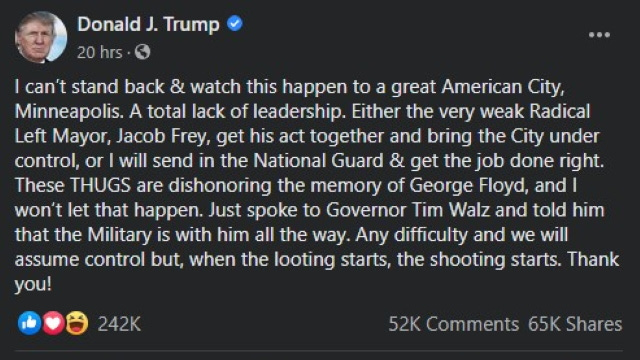
As both the public and national media took note of the two social media platform’s distinctly different approach to Trump’s violent rhetoric, Mark Zuckerberg was eventually forced to say something. In an impressive display of weasel-words, Zuckerberg wrote a lengthy post justifying his decision to leave the President’s egregiously terms-of-service violating emission up, claiming (as he had before in response to Myanmar) that the company “shouldn’t be the arbiter of truth.”
Mark was, I suspect, surprised when his word salad failed to turn down the heat on both himself and his company.
Repulsed Facebook employees publicly called both Zuckerberg and Joel Kaplan out, accusing their leaders of bending over to accommodate the whims of the GOP. Soon, over 800 advertisers had joined a boycott against the company, including heavy-hitters like Coca-Cola, Ford, and Unilever. Caught between a rock and a hard place, Zuckerberg finally agreed at the end of June to do more to remove violence-inciting posts and to label posts by politicians with virulently policy-flouting content.
While many critics from the left were temporarily quieted by this move, Facebook’s woes weren’t over yet.
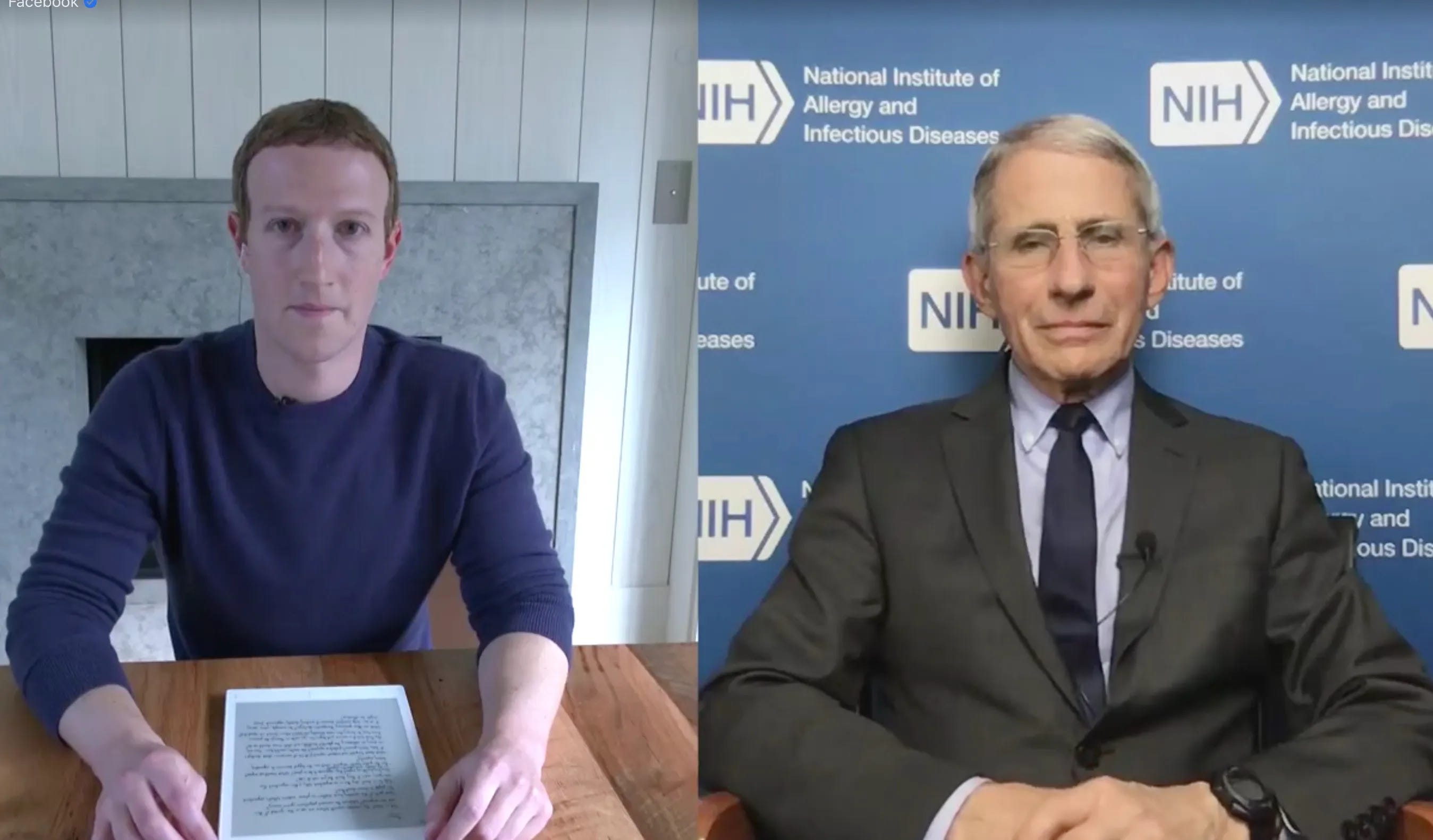
In mid-July, Zuckerberg, in a rare display of semi-human sentiment, openly criticized the Trump administration’s stunningly shit response to the virus in a live interview with Dr. Anthony Fauci. Soon after the Fauci comments, Zuckerberg insisted to Axios that he didn’t have a secret deal with Trump, as some media outlets had begun to speculate - though he did confirm that he spoke with the President “from time to time.” Trump, for his part, largely kept quiet about these open provocations. For a few days, it seemed like Zuckerberg was, infuriatingly, managing to once again get away with his obfuscating aw-shucks act.
Then in early August, Trump claimed (falsely) in a Fox and Friends interview, which he shared on Facebook, that children are “almost immune” from Covid-19. Facebook, pushing its luck, decided that it would hold the President to its terms of service: it deleted Trump’s video.
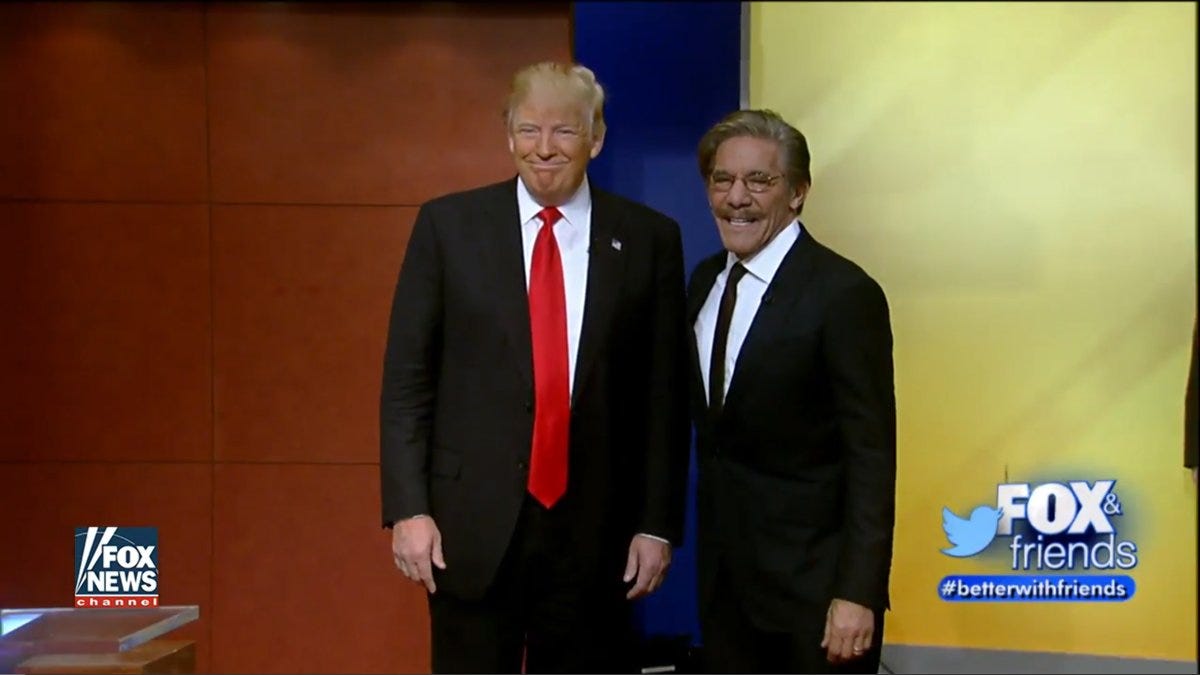
Predictably, Trump lost his shit, and perhaps even more predictably, he lost his shit during an interview with Gerald Rivera.
After deeming his comment on Covid to be “a perfect statement, a statement about youth,” he took up his old claim that Facebook was censoring him. “They’re doing anybody, on the right, anybody, any Republican, any conservative Republican is censored and look at the horrible things they say on the left,” Trump wailed to Geraldo’s sympathetic listeners.
By September, Trump was making ominous noises at the White House about taking “concrete legal steps” against social media sites that censored conservatives online. The relationship between the President and Facebook would remain distrustful at best until Trump - grudgingly - left office.
Which was, of course, a good thing. The Trump administration’s wildly unpredictable behavior and constant hostility to Silicon Valley’s prideful overlords ensured that both the government and Big Tech would fail to pull off the frightening privacy-destroying partnership I’d been so afraid of when the pandemic first began.
But bad as the relationship between Trump and Zuck now was, Donald Trump was still allowed on the platform. Which he used to spewed claims about voter fraud up to and after the 2020 election, and where his supporters openly discussed the plans that would eventually lead to January 6th in ever-more-deranged Facebook groups.
On that particular day of infamy, Facebook did suspend Trump’s account. But only after Twitter did it first. (Trump now has his Facebook account back, but he doesn’t use it much. The moment has passed).
Facebook found little friendliness from the new Biden administration, populated by staffers who were far less enamored with big tech than the technocrats of the Obama era had been.
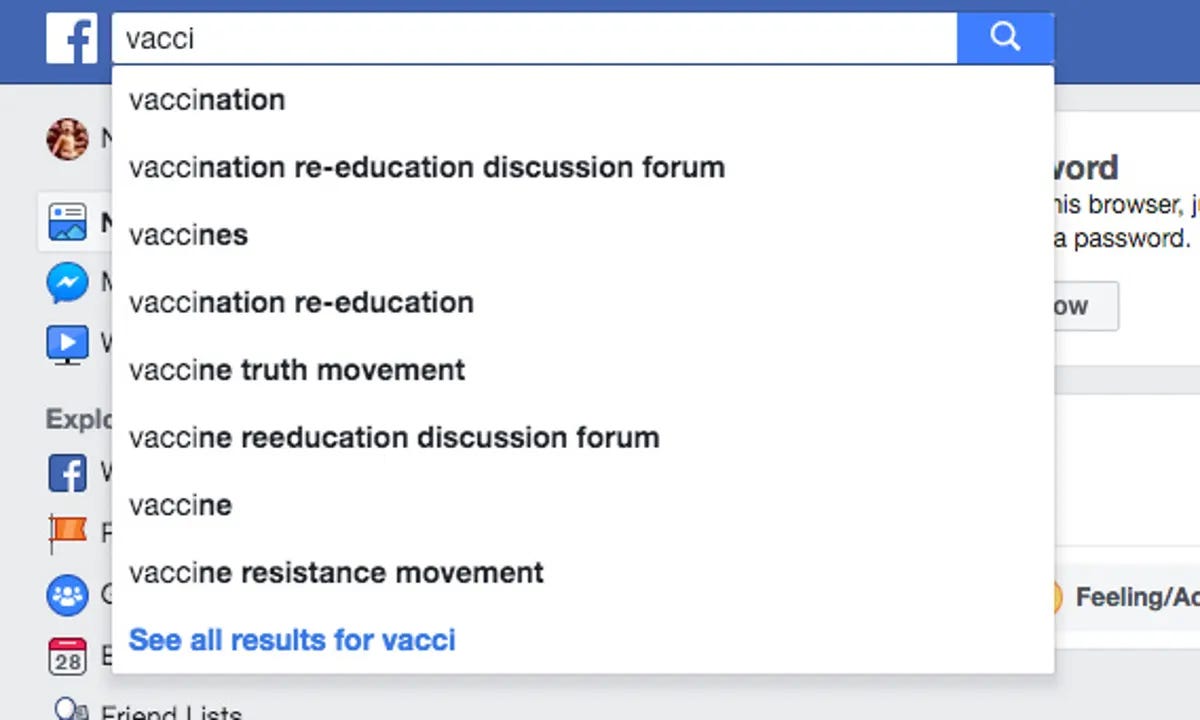
Biden’s team immediately criticized the company for failing to adequately control rampant disinformation about the Covid vaccine, as the Democrat-led administration set about frantically picking up the pieces of the GOP’s disastrous pandemic response. Meanwhile, it battled with Biden in public, Facebook (per whistleblower revelations) carefully tracked the spread of Covid disinformation internally - while consistently sharing as little of their findings with the new Democrat-led government as possible.
Eventually, Facebook did eventually, begrudgingly, give into Biden administration pressure to take down obvious Covid-19 bullshit. It was a move that was in alignment, you might recall, with what Zuckerberg publicly claimed he was going to do when the pandemic began.
It was also a choice that the GOP is now, as I write this in the summer of 2023, using to bolster their nonsense claims (which they’ve been making in one form or another since 2015) that the Biden administration is unjustly censoring the GOP on social media.
A Louisiana judge recently used this exact rationale to ban federal agencies and officials from working with social media companies to address “protected speech.” And much of the media continues to politely ignore the fact that Trump and the GOP have spent years blatantly pressuring social media companies to cater to them, actions they’ve figured out they can obfuscate by shrieking as loudly as possible about how they’re being oppressed by the Coastal Elite.
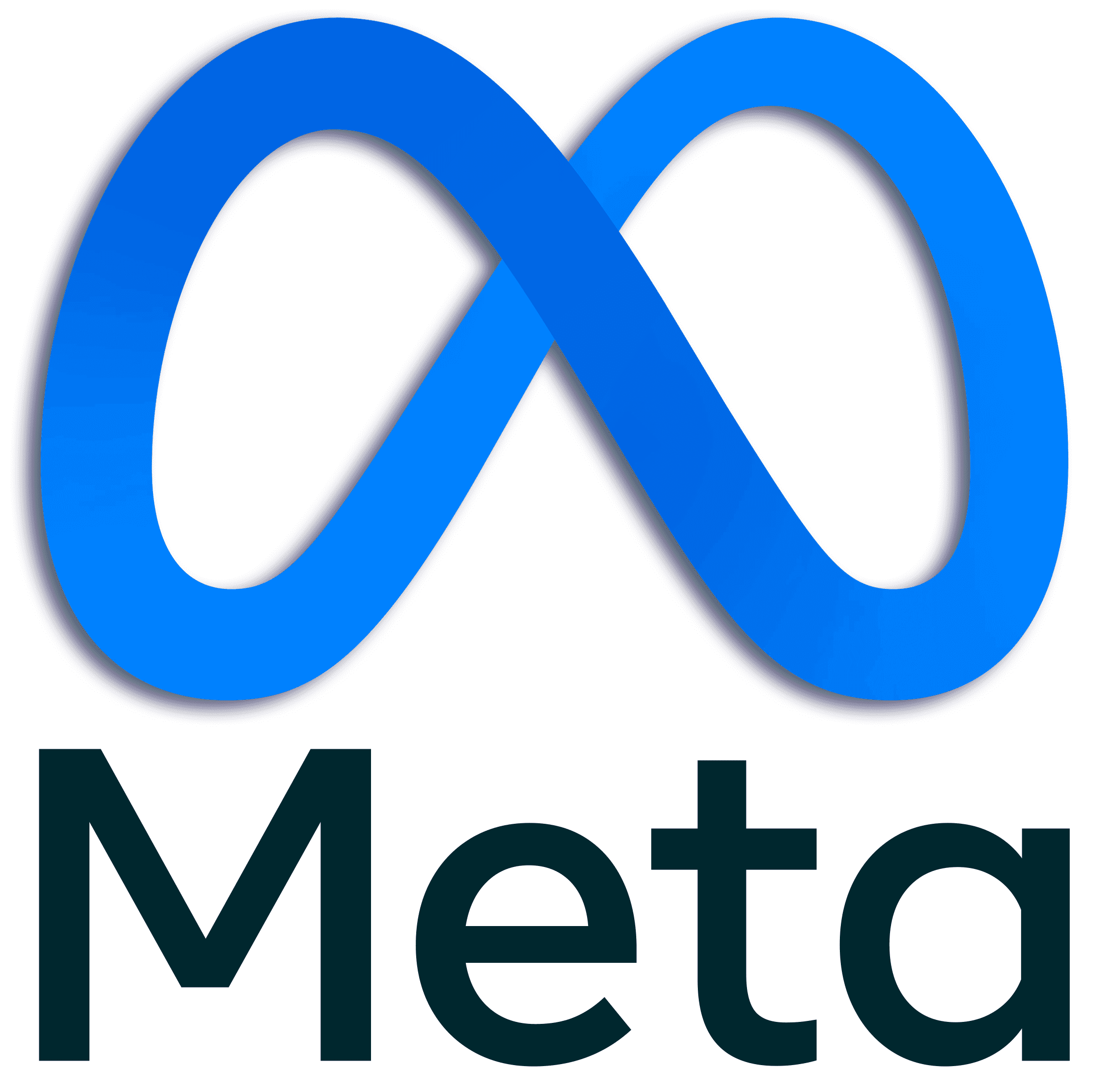
And then came Meta.
At the end of 2021, Zuckerberg, high on an in-house supply incomprehensible to the likes of groveling, ground-dwelling peasants like us, announced that his company would be changing its name, placing products like Facebook, Instagram, and WhatsApp under the same blandly ominous title.
What’s more, the whole shambling horror would be pivoting operations over to something he’d dubbed the Metaverse, an incomprehensible concept that was - I think, it’s terrifically hard to say for sure - positioned somewhere in between hideous NFTs of vomiting apes, The Blockchain (such as it is), and a 2005-era VR video game where you don’t have any legs. Supposedly, it was a play to attract more young people, more hip people, to Meta’s increasingly geriatric lineup of products. After all, nothing says youthful cool like dropping fake computer money on virtual branded estate.
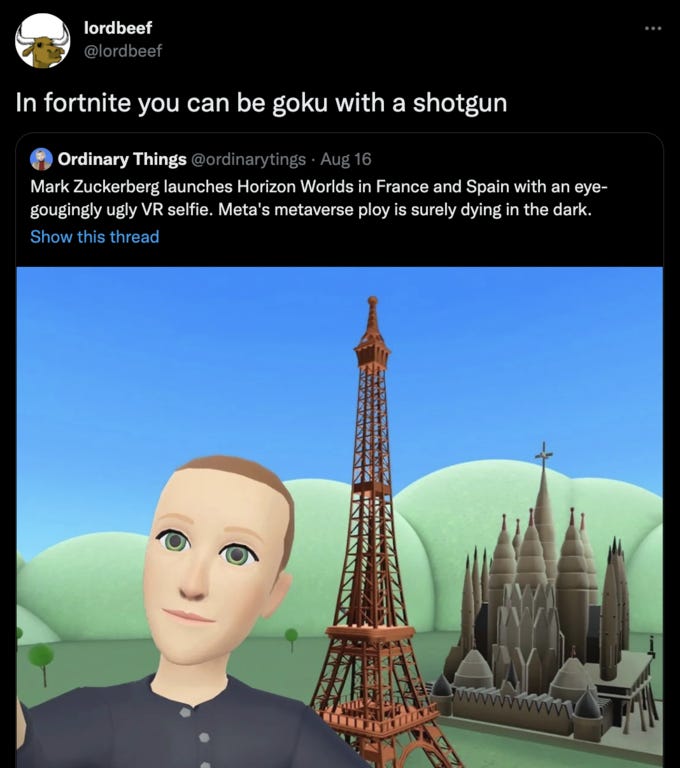
Unsurprisingly to everyone who isn’t Mark Zuckerberg, the Metaverse was a majestic, world-beating failure. Meta hemorrhaged money, burning billions of dollars in pursuit of a lame product that nobody wanted. The company’s frantic flailing drove even more people away from Facebook’s both grotesquely ethically compromised and now terminally lame platform. For the first time ever, in early 2022, Facebook started losing users.
Facebook, or Meta, was by no means dead. But Facebook, surprisingly, had stopped feeling inevitable.

As the world became aware of Elon Musk’s manure-brained battle to weasel out of buying Twitter in 2022, the attention of what remained of tech journalism shifted away from Zuckerberg’s failings to Musk’s even splashier, rocket-fuel stained antics. By 2022, the Metaverse’s incredible, legless failure had conditioned many people to view the company as more absurd than it was outright evil. I noticed a considerable uptick in fluff pieces about how Mark Zuckerberg was learning BJJ, like a normal human with normal, relatable hobbies.
For Mark, Elon Musk’s incredible two year effort to light his own reputation on fire has also had the remarkably convenient knock-on effect of making him seem reasonable. “Yes, Zuckerberg’s companies ransack private data and tear apart societies, and he does openly thirst for world domination,” some reasoned, “but you also don’t see him promoting creepy eugenics theories, blowing up rockets in environmentally sensitive areas, or directly meddling in the Ukraine War.”
And so, Zuckerberg and the Metaverse and everything else were able to slink back into the shadows for a bit. Sure, there were still stories about how the company was failing to control hate speech in conflict zones. How it had been slapped with more historically huge and yet affordable fines from the European Union. How people in poor countries were getting charged for their supposedly free Facebook-branded mobile data. But the media had, largely, shifted its coverage of man-made horrors beyond our comprehension to the latest, splashiest abominations that Elon was involved in.
When Elon Musk finally did walk into Twitter HQ with a shit-eating grin and a stupid Home Depot sink in his hands, his status as the Internet’s new Most Hated Man was secured. And it became terribly apparent that Twitter as we knew it, as I knew it, was gone for good, and something much, much worse was going to take its place.
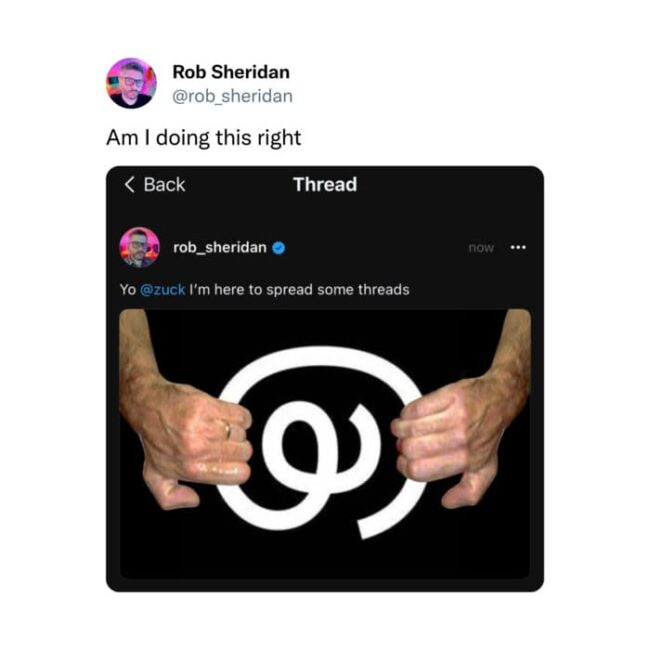
Enter Threads.
Meta’s Twitter-killer features little news by design, in line with Meta’s new hardline strategy against accommodating those press-room bastards that have inflicted them with so many indignities in the past. It also has even less moderation than Facebook or Instagam ever did, echoing both Musk and Zuckerberg’s profoundly cynical, if hard to argue with, realization that governments don’t have the courage to force them to make their websites less evil. Unsurprisingly, the site already has a hate-speech problem.
Somehow, some people, mourning over the terminally-ill wreck of what was once Twitter, are still hailing Zuckerberg as something of a savior, or at least, as someone who’s substantially less evil than Elon Musk (which is wrong, but is very convenient for Zuck). Others are shrugging and leaning into Threads, shifting back into the once all-powerful idea that Facebook is inevitable, that resisting it is as foolish as shooting into the eye of a hurricane.
As for me? I’m somewhat afraid of Threads, albeit less so now, in August, then I was when it first came out in July, as it’s become clear that the service isn’t becoming the default Twitter-replacement that Meta had so fervently hoped it would be. But I’m also angry about Threads, the kind of rage that develops when you see your oldest and most loathsome enemy somehow survive threat after threat, and continue to shamble hungrily on.
I’m angry about how Mark Zuckerberg and Facebook and all the rest of his horrible companies have been able to spend the last 15 years getting away with it, how they never seem to suffer truly meaningful consequences for constantly, continuously, making the world worse. And I’m also angry about how so many people know what Zuckerberg is, and know what he’s done, and are still willing to give him yet another chance.
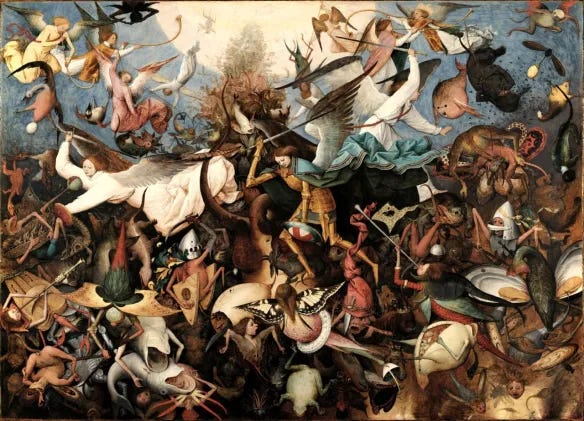
“Maybe this time, he won’t be evil!” people say, and then he does something evil again, and the same people claim that this was, somehow, a surprise. It’s a lot like inviting the Dread Vampire Zartok into your home, even after he’s drained the blood of your neighbors, because he hasn’t drained your blood yet. It’s a form of collective madness, or at least, it makes me, and everyone else who has spent years trying to warn people, feel mad.
Oh, I’d like to imagine that Mark Zuckerberg sleeps terribly.
That every night, the hungry ghosts of the dead close in upon him.
The small, charred ghosts of the Rohingya children burned alive in their homes, who still smell faintly of smoke and cooked flesh.
The pale and bloated ghosts of the people who drowned in the Mediterranean after fleeing ethnic cleansing in their home countries, whose faces have been nibbled upon by deep-sea fish.
The suicides.
The men and women slowly tortured to death in secret Syrian prison cells.
They gather around him, and they whisper things that cannot be written into his ear. And he is tormented.
But that’s a fantasy.
Mark Zuckerberg is a man who sleeps well. He has hobbies. He enjoys non-descript barbecue sauce. He’s happily married. He has none of the freakish, manic anxiety that swirls around Elon Musk. Zuckerberg is self-assured.
He walks, serene, under a shield of plausible deniability. After all: he didn’t burn those Rohingya villages himself. He didn’t lead the soldiers that chased those Muslim Indians off of their land, or the vigilantes killing their ethnic enemies in Ethiopia.
He didn’t personally destroy the self-esteem of teenage girls, or publicly stream a mass-shooting at a mosque in New Zealand, or coordinate storming the Capitol on January 6th. He didn’t spread the lies that persuaded millions of Americans to wave off the vaccines that might have saved their lives, and he didn’t give those Kenyan moderators the PTSD that makes them see the faces of the screaming dead at night.
Certainly, Zuckerberg would acknowledge that his website played a role. But who’s to say how much of one? It is so hard to quantify these things. And there are fewer and fewer people left who have the time and the resources to try.
“But can we really blame Facebook for that?” some people will say. “Wasn’t journalism already in trouble before he came along?
Maybe. But isn’t it interesting how Mark Zuckerberg and his company exists entirely in a cocoon of plausible deniability, in an ecosystem they’ve designed to exquisitely accommodate their own version of reality?
Perhaps I am too hard on Mark Zuckerberg.
Perhaps he deserves another chance to connect the world, like he says he always meant to do. Move fast. Break things. You have to make a few mistakes to get ahead. Just a few little mistakes.
“The idiots trusted me,” Mark Zuckerberg famously said, in the early-on years, when people had not learned what he was yet.
No. I won’t be posting on Threads.
